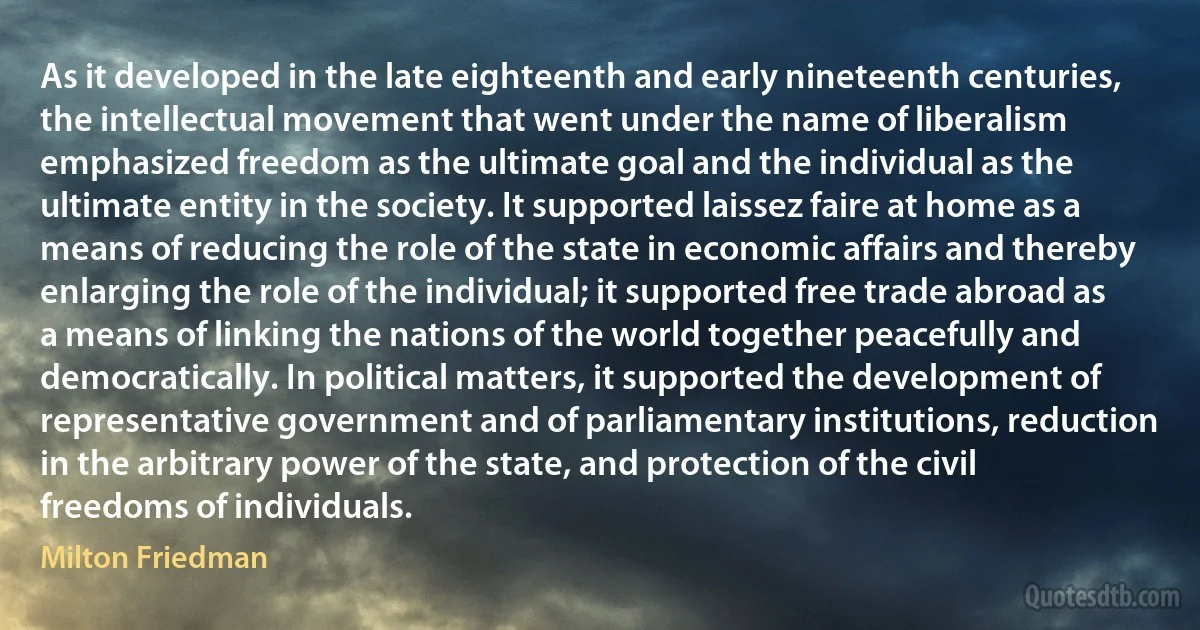
As it developed in the late eighteenth and early nineteenth centuries, the intellectual movement that went under the name of liberalism emphasized freedom as the ultimate goal and the individual as the ultimate entity in the society. It supported laissez faire at home as a means of reducing the role of the state in economic affairs and thereby enlarging the role of the individual; it supported free trade abroad as a means of linking the nations of the world together peacefully and democratically. In political matters, it supported the development of representative government and of parliamentary institutions, reduction in the arbitrary power of the state, and protection of the civil freedoms of individuals.
Milton FriedmanRelated topics
abroad arbitrary development early eighteenth enlarging entity free freedom went government home intellectual late liberalism linking name nineteenth parliamentary power reducing reduction representative state trade ultimate under world means affairsRelated quotes
As we saw, there is a large class of personal names and name-elements common to the Late Books and hymns of the Rigveda (386 hymns in the Late Books of the Rigveda and 8 Late hymns in the earlier Books), and to the Avesta (the bulk of the names, right from the name of the first composer of the Avesta, and the names of his closest associates), the Mitanni (including every common name element known), and the Kassites (the only known name). These names and name-elements are fundamental to all four groups, but completely absent in the Early and Middle Books of the Rigveda (apart from the 8 Late hymns mentioned earlier). And all these names and name-elements are very common in post-Rigvedic texts.

Shrikant Talageri
Dear friends, liberty is the most precious of gifts. My generation never had to fight for this freedom, it was offered to us on a silver platter, by people who fought for it with their lives. All throughout Europe American cemeteries remind us of the young boys who never made it home, and whose memory we cherish. My generation does not own this freedom; we are merely its custodians. We can only hand over this hard won liberty to Europe's children in the same state in which it was offered to us. We cannot strike a deal with mullahs and imams. Future generations would never forgive us. We cannot squander our liberties. We simply do not have the right to do so.

Geert Wilders
Leading a life like that got me thinking about some big questions. It is sometimes said that Americans and Europeans differ a lot and that they are growing further apart. I disagree-we share the same fundamentals, and that binds us together. Western societies guarantee their citizens something that no other civilizations grant them: privacy. It's one of those things you tend to take for granted unless you lose it. The importance of privacy is unique to Western society with its notion of the sovereign individual. In stark contrast to Western norms, Islam robs people of their privacy and dignity. Islamic societies-including Islamic enclaves in the West-exert tight social control that is indicative of the totalitarian character of Islam.

Geert Wilders
The Nobel Prize confers on an individual an authority which in economics no man ought to possess.
This does not matter in the natural sciences. Here the influence exercised by an individual is chiefly an influence on his fellow experts; and they will soon cut him down to size if he exceeds his competence.
But the influence of the economist that mainly matters is an influence over laymen: politicians, journalists, civil servants and the public generally.
There is no reason why a man who has made a distinctive contribution to economic science should be omnicompetent on all problems of society - as the press tends to treat him till in the end he may himself be persuaded to believe.

Friedrich Hayek
We no longer have political movements. While thousands of us may come together for a rally or march, we are bound together on such occasions by a single shared interest. Any effort to convert such interests into collective goals is usually undermined by the fragmented individualism of our concerns. Laudable goals-fighting climate change, opposing war, advocating public healthcare or penalizing bankers-are united by nothing more than the expression of emotion. In our political as in our economic lives, we have become consumers: choosing from a broad gamut of competing objectives, we find it hard to imagine ways or reasons to combine these into a coherent whole. We must do better than this.

Tony Judt
